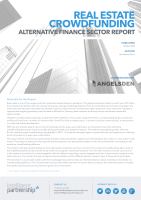
 www.intelligent-partnership.com
www.intelligent-partnership.com
Real Estate Crowdfunding
, ,Alternative Finance Sector Report - October 2014
13
REAL ESTATE CROWDFUNDING
ALTERNATIVE FINANCE SECTOR REPORT
PUBLISHED
October 14
AUTHOR
Samantha Goins
Investment Terms
Real estate is considered to be medium
to long-term investment, with annual
rental income and capital growth over the
longer term. Short term options such as
off-plan and redevelopment projects also
exist.
Equity investments are commonly into
unlisted companies with no established
secondary market. These tend to be
longer term investments ranging from 1
to 8.5 years. The average term is 4 years.
Investors should note that although the
aim will be to sell the underlying assets
after a fixed term there is no guarantee
that a sale will happen and investors
should be prepared to be flexible.
Established companies are more likely
to use debt based investments to fund
individual projects or expansion of their
activities. For this reason the average
investment term is lower at 1.5 years.
Investment terms range from only 5
month to up to 3 years. These are much
shorter than traditional real estate
investments and means investors do not
have to tie up their capital over a long
timeframe.
Investment Terms Equity vs Debt (2014)
Source: Intelligent Partnership
Returns
The search for higher returns is one
of the main drivers for investors to
consider crowdfunding, particularly as
bank interest rates on savings are so
low. Returns are usually predicted for
equity based investments and fixed for
debt based. Note that returns will be
influenced by location, type of property,
build stage and local market demand.
In return for taking on higher risk with
equity based investments you expect
higher returns. Forecast returns range
from 7% to 33% per year, with an average
of 18% per year. Debt investments
advertise strong fixed returns of between
7% and 19% per year. The average is
14.25% per year. These returns remain
consistent with the IDP UK Commercial
Property total return index, showing that
these returns are realistic.
Returns Equity vs Debt (2014)
Source: Intelligent Partnership
Exits
The exit for equity and co-investment
models relies on the sale of the
underlying property. Each investment
states when the developer hopes
to sell the property to achieve the
targeted return. Some equity models
allow investors to sell their shares to
other shareholders with permission
from the investment provider. As
mentioned previously there is currently
no established secondary market for
equity based crowdfunding investments
although some platforms are likely to
implement online marketplaces in the
near future.
Debt investments typically have a defined
exit on maturity of the loan, when it must
be repaid in full. It is difficult for investors
to exit before this date as yet there is
not an established secondary market,
although some platforms will look to
implement marketplaces to facilitate this,
as has been seen in the P2P markets in
the UK and US. Investors may also be
allowed to sell their investments privately
before maturity with permission from the
investment provider.
Conclusions
The real estate crowdfunding concept is
growing rapidly and in locations all over
the world, giving investors the benefit of
an asset backed real estate investment
and the opportunity to achieve stellar
returns at a much lower investment level.
Crowdfunding provides more options
to the investors around the investment
timing, type and location of the property.
71% of platforms undertake some
form of due diligence before listing
an investment
38% of investments were structured
as equity and 40% debt
Average annual returns from equity
based real estate crowdfunding are
18%
Average annual returns from debt
based real estate crowdfunding
investments are 14.25%
Residential property based
investments were the most popular
with 57% of the market
Additional Information
Angels Den
hosts free Business Funding
Clinic to educate fund seekers before
pitching to potential investors and
Speedfunding events for investors to hear
fund pitches and ask business owners
questions before deciding to invest.
Massolution
provides crowdfunding
and crowdsourcing market research,
data and updates across all sectors of
crowdfunding.
Alt Fi
provides data and news for the
alternative finance sector.
UK Crowdfunding
provides background
information and self-regulation for UK
platforms.
Times Realty
News provides market
updates and commentary on the real
estate crowdfunding sector.
Equity
Debt
Minimum Maximum Average
1
8.5
4
3
1.5
0.5
Equity
Debt
Low High Average
7% 33% 18%
19% 14.25%
7%
















